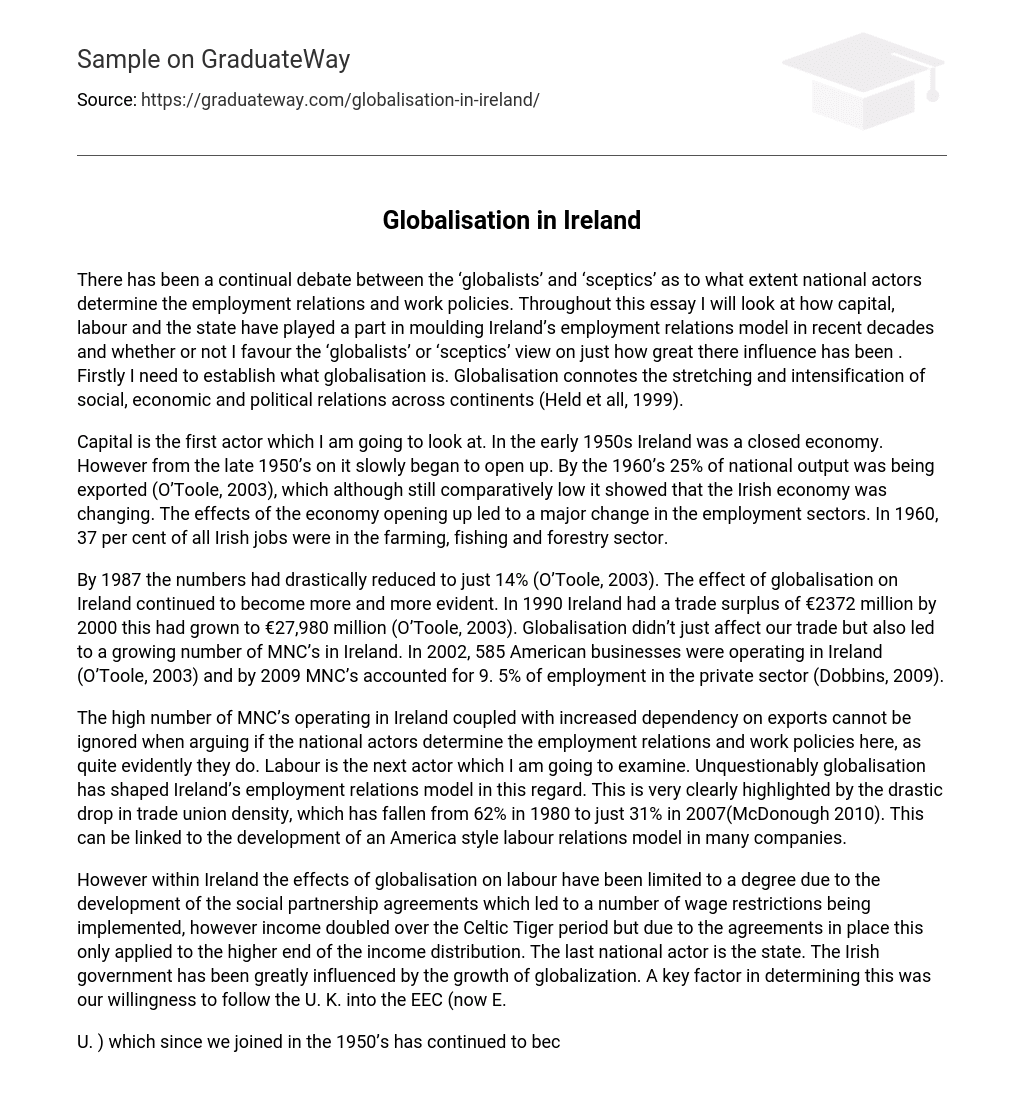The topic of the influence of national actors on Ireland’s employment relations and work policies attracts attention from both globalists and skeptics. This essay explores the impact of capital, labor, and the state on Ireland’s employment relations model in recent times. It also evaluates my stance towards the level of influence held by globalist or skeptic perspectives. Firstly, it is essential to define globalization as per Held et al.’s (1999) explanation: globalization encompasses the widening and deepening connections in social, economic, and political aspects across various continents.
Examining the first actor, capital, reveals that in the early 1950s, Ireland operated as a closed economy. However, from the late 1950s onwards, it gradually became more open.
During the 1960s, about 25% of Ireland’s national output was exported (O’Toole, 2003), indicating a transformative shift in the Irish economy.
The opening up of the economy had significant implications for employment sectors. In 1960, around 37% of all jobs in Ireland were within the farming, fishing, and forestry industry.
The reduction in numbers dramatically decreased to only 14% by 1987 (O’Toole, 2003). The impact of globalisation on Ireland became increasingly visible. In 1990, Ireland had a trade surplus of €2372 million, and by 2000, this figure rose to €27,980 million (O’Toole, 2003).
In addition to affecting trade, globalisation also led to the increase in the number of multinational companies (MNCs) in Ireland. According to O’Toole (2003), there were 585 American businesses operating in Ireland in 2002. Moreover, MNCs accounted for 9.5% of employment in the private sector by 2009 (Dobbins, 2009).
The presence of numerous multinational corporations (MNC’s) and the reliance on exports in Ireland play a significant role in determining employment relations and work policies. It is evident that these national actors have a strong influence. The impact of globalization on Ireland’s employment relations model is evident in the substantial decline in trade union density, dropping from 62% in 1980 to only 31% in 2007 (McDonough 2010). This shift can be attributed to the adoption of an American-style labor relations model by many companies.
However, in Ireland, the impact of globalization on labor has been somewhat constrained due to the establishment of social partnership agreements. These agreements have resulted in the implementation of wage restrictions, limiting the effects of globalization on income distribution. Despite this, income doubled during the Celtic Tiger period, but only for those at the higher end of the income scale. Another significant actor in this context is the state. The Irish government has been heavily influenced by the growth of globalization, particularly through its decision to join the EEC (now E).
Since joining in the 1950’s, the European Union has increasingly influenced our state and eroded national systems. It is important to acknowledge our state’s eagerness to attract foreign direct investment (FDI), which led to the establishment of Enterprise Ireland. FDI grew significantly, with a 700% increase in 1989 and reaching €30 billion by 2002, four times its size in 1986 (McDonough, 2010). The state has clearly embraced globalization and allowed its impacts to shape our employment relations model.
Conclusively, I firmly support the globalists’ perspective and assert that national actors significantly influence our employment relations model and work policies. Furthermore, I present my final argument against the sceptics’ belief that national actors have not impacted Ireland’s employment relations model by referring to the Ernst and Young Globalisation Index 2010, where Ireland was ranked the second most globalised country. This ranking clearly suggests that globalisation must have had an influence on Ireland.
Bibliography:
Dobbins, T. (2009) Ireland: Multinational companies and collective bargaining, Eurofound.
Held, D., McGrew, A., Goldblatt, D., Perraton, J. (1999) Global Transformations: Politics, Economics, and Culture. Cambridge: Polity Press.
McDonough, T. (2010) The Irish Crash in Global Context, Department of Economics, National University of Ireland, Galway
O’Toole, F. (2003): After the Ball. Chapter 1: GLOBAL IRELAND





